You need the very best option available to you today, not years from now
Clinical trials are the final stages of cancer research that assess a potential new drug or therapy that’s already been studied extensively in the laboratory. Trials are carefully monitored scientific studies that involve patients and offer the earliest access to these newest treatment options.
Trials are conducted to determine a drug’s proper dose, how well it works and whether it’s more effective than current standard treatments. All drugs and treatment approaches currently used as standard of care were once studied in clinical trials.
Roswell Park opens new clinical trials every day. Learn more about our clinical trials for myeloma here or call 1-800-ROSWELL (1-800-767-9355). Talk to your physician about upcoming trials not yet listed here that might be right for you.
In the pipeline
Multiple myeloma still is not curable in the vast majority of patients. Through imaging research, our team is trying to answer key questions that may lead to new and more effective treatments: Are myeloma cells different in different parts of the body? Why do some myeloma cells cause bone damage in some areas of the skeleton but not in others?
In one study, we take the usual bone marrow biopsy that is the standard of care for myeloma patients. Then we take additional samples from areas of the body where we detect very high disease activity. We use a procedure called single-cell sequencing to look at the RNA of the cells to learn how they are different from one another.
We have already found interesting differences in how the cells behave depending on where they are found. We hope this information will enable us to develop ways of treating patients more effectively and eventually to find a cure for multiple myeloma.
Imaging innovation
On a large scale, through clinical trials we’re using imaging techniques such as PET-CT and functional MRI to:
- Accurately locate clusters of myeloma cells and areas of bone destruction in the body.
- Understand how the disease is distributed through the body and how the different types of myeloma cells (which may be caused by different gene mutations) change over time.
- Detect any disease remaining in the body after treatment, which might cause the multiple myeloma to return.
Jens Hillengass, MD, PhD, Chief of Myeloma, has established new imaging techniques to better identify and measure the amount of bone destruction and find out how extensively the multiple myeloma cells have invaded the bone marrow. As a member of the International Myeloma Working Group (IMWG), he has developed new guidelines for the use of imaging in myeloma and other monoclonal plasma cell disorders. As a result of his discoveries, the IMWG now recommends using MRI results to identify multiple myeloma that requires systemic (whole-body) treatment.
Mining the microenvironment
Roswell Park researchers were among the first to recognize that multiple myeloma can be attacked effectively with treatments that disrupt the microenvironment that allows the myeloma cells to grow. By developing new treatments that focus on the immune system and the microenvironment rather than just the cancer cell itself, we hope to improve survival rates and spare patients the side effects of chemotherapy. Specifically, we are trying to better understand the interaction between myeloma cells and the bone marrow environment, so we can develop a more powerful way to attack myeloma cells — not directly, but through the “soil” in which they grow.
- We’re identifying new targets (genes or proteins in the myeloma and surrounding immune cells) so we can develop treatments aimed at those targets.
- We’re finding better ways to detect small amounts of disease that remain after treatment, which can stand in the way of a cure.
We’re also working to develop new multiple myeloma treatments that focus on:
- Understanding how the environment in the bone marrow supports the growth of multiple myeloma and finding ways to disable that support.
- Determining the best timing for eligible patients to undergo stem cell transplant.
